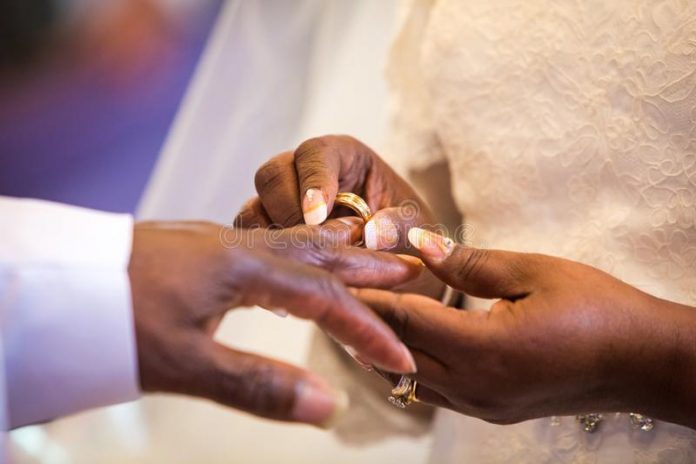Have you noticed a subtle shift in how some churchgoers approach wedding vows? It’s a fascinating development, especially for those who’ve deeply embraced the “declare it and claim it” message, a central tenet of the prosperity gospel.
This idea, that speaking something into existence will bring it to pass, appears to be leading some to adjust those traditional “for richer, for poorer, for better, for worse, in sickness and in health” lines into declarations like “for richer, for richer,” “for better, for better,” and “in health, in health.”
The prosperity gospel, with its hopeful message that faith and positive declarations can unlock blessings like good health and financial success, resonates deeply with many believers.
The “declare it and claim it” principle is particularly powerful. It encourages individuals to literally speak their desired reality into being, trusting that God will honor their declarations. While this can certainly foster hope and a sense of divine agency, applying it to foundational commitments like marriage vows brings up some intriguing questions.
Consider wedding vows for a moment. They are meant to be a solemn vow to stand by one’s partner no matter what life throws their way. Phrases like “for richer, for poorer, for better, for worse, in sickness and in health” aren’t just archaic words; they’re profound acknowledgments that life can be unpredictable, and challenges are an inevitable part of the journey.
They signify a commitment that transcends circumstances, rooting the marital bond in unflinching loyalty and unconditional love, regardless of external prosperity, personal struggles, or physical well-being.
By explicitly addressing potential adversities in their vows, couples implicitly prepare themselves for the demanding journey of mutual support and resilience.
However, for those steeped in the “declare it and claim it” philosophy, these traditional vows might be perceived differently. The idea of speaking “sickness,” “poorer,” or “worse” into existence could be seen as self-defeating, even an act of inviting negativity that contradicts the principles of positive declaration.
If one truly believes their words have the power to manifest reality, then it logically follows that they would choose to declare only health, wealth, and “better.” This perspective, while rooted in a sincere desire for divine blessing, inadvertently sidesteps the uncomfortable yet universal truth that “life happens.”
The potential ramifications of such a shift are significant. Marriage, at its core, is a covenant designed to weather storms. When vows primarily emphasize an idealized state of perpetual health, abundance, and “better,” what happens when illness strikes, financial hardship descends, or a period of “worse” inevitably arrives?
Does the absence of an explicit declaration for “sickness,” “poorer,” or “worse” imply a weakening of the foundational commitment when these realities inevitably manifest?
Crucially, this trend risks creating a theological and emotional disconnect when adversity inevitably arises. If a declared reality of “health to health,” “richer to richer,” or “better to better” is contradicted by a serious diagnosis, significant financial loss, or a challenging personal season, individuals might grapple with profound questions of faith and divine fidelity. Does it mean God “didn’t come through”? Does it imply a failure in their own declaration or faith? This could lead to disillusionment, spiritual doubt, and an unpreparedness for the hard work of marriage when faced with realities that defy their declared expectations.
The true beauty and strength of wedding vows lie in their comprehensive embrace of life’s full spectrum. They prepare couples not just for joyous celebrations but also for the quiet fortitude required during trials.
They articulate a love that is resilient, adaptable, and enduring—a love that vows to nurture and sustain “until death do us part,” irrespective of the immediate circumstances. This steadfast commitment is beautifully reflected in scripture, which often speaks to the enduring nature of love and the importance of perseverance.
Consider 1 Corinthians 13:7 (NKJV) often quoted in wedding ceremonies, which describes the all-encompassing nature of true love: “Love bears all things, believes all things, hopes all things, endures all things.”
This verse doesn’t suggest that love prevents hardship; rather, it emphasizes love’s capacity to withstand and persevere through all challenges. It paints a picture of a love that is not shaken by “worse,” “poorer,” or “sickness,” but actively supports and remains steadfast through them.
Such a biblical understanding of love provides a robust underpinning for traditional vows that acknowledge the full scope of life’s journey, recognizing that true commitment is most powerfully demonstrated when circumstances are least ideal.
While the aspiration for a healthy and prosperous life is natural and often commendable, a theology that inadvertently denies the reality of human vulnerability and the cyclical nature of life’s fortunes may inadvertently leave individuals ill-equipped for the true demands of a lifelong partnership.
Churches and spiritual leaders have a vital role to play in guiding congregants to balance the powerful message of faith and divine vow with a grounded understanding of human experience, ensuring that wedding vows remain a robust foundation for marriages built on unbreakable commitment, come what may.
The true strength of a vow lies not in the perfection it declares, but in the unflinching vow it makes in the face of an imperfect world.










